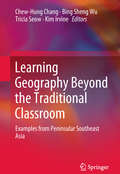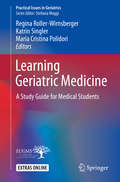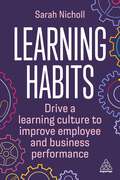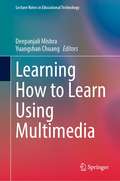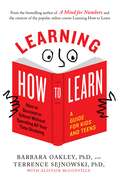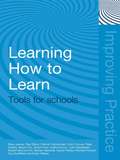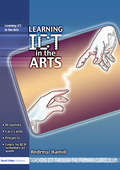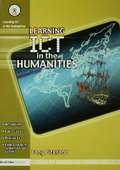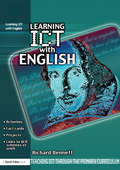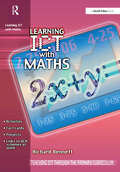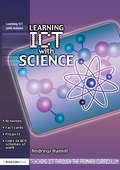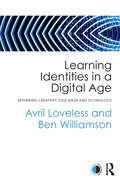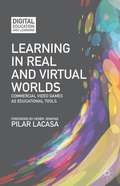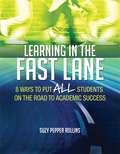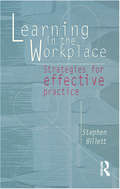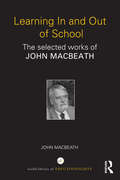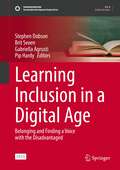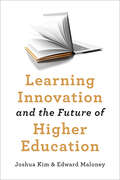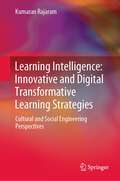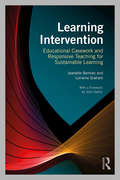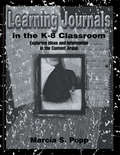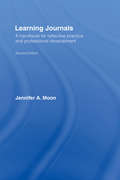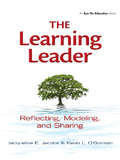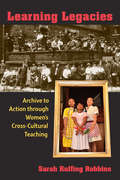- Table View
- List View
Learning Geography Beyond the Traditional Classroom: Examples From Peninsular Southeast Asia
by Chew-Hung Chang Bing Sheng Wu Tricia Seow Kim IrvineThis book provides a collection of critical pieces that support the idea that good teaching and learning of geography in fieldwork and using technology should consider the dimensions of curriculum design, instructional design and resource provision, as well as assessment for such learning activities. Further, it clearly describes the thinking, experiences and critical comments concerning two broad areas of learning outside the traditional classroom – in the field and with technology.
Learning Geriatric Medicine: A Study Guide For Medical Students (Practical Issues in Geriatrics)
by Regina Roller-Wirnsberger Katrin Singler Maria Cristina PolidoriThis textbook presents hands-on training material for medical students. The style reflects the need for practice-based teaching with a modern edge in daily clinical routine; accordingly, it also employs online material and pocket cards. Each chapter begins with specific learning objectives, which are cross-referenced with the European curriculum for undergraduate medical education released by the European Union of Medical Specialists (UEMS) together with the European Union Geriatric Medicine Society (EUGMS), as well as the minimum geriatric competences for medical students established by the American Geriatrics Society (AGS). World-renowned European experts in practicing and teaching the interdisciplinary field of Geriatrics contributed to this work, with the aim of offering the new generation of health professionals a global perspective on one of the greatest public health challenges of our time: the management of the steadily increasing number of older, multimorbid, and vulnerable persons. The major strength of this book – published under the auspices of the EUGMS – is its pragmatic, goal-oriented approach, which makes it suitable for bedside learning and patient-centered medicine; further, all of the chapters are firmly based on the pillars of the ageing process in all of its biological aspects, helping readers understand the pathophysiology of and rationale behind interventions for the main geriatric syndromes and disorders.
Learning Habits: Drive a Learning Culture to Improve Employee and Business Performance
by Sarah NichollA learning culture is essential to outperform the competition but how can Learning and Development (L&D) professionals achieve this? What habits do they need to develop in their workforce? Learning Habits is written by an author with over 20 years' experience using learning science to improve both business and employee outcomes. It explains what habits are necessary for an effective learning culture and how to develop them at individual, team and organizational levels. This book outlines each habit, explains what it is, why it makes a difference and how to measure it as well as providing a framework that can be used to make these habits become routine to ensure the learning sticks. Each habit is underpinned by behavioural science research and supported by practical advice, real world examples and case studies from global organizations. Learning Habits also includes checklists to track progress, a 'cue, routine, reward, reflect' model to make learning habits core to how the business operates and templates for measurement. This book is essential reading for all L&D practitioners who know that building a learning culture is crucial for individual and business success but don't know where to start.
Learning How to Learn Using Multimedia (Lecture Notes in Educational Technology)
by Deepanjali Mishra Yuangshan ChuangThis book introduces the concept of multimedia in education, and how multimedia technology could be implemented to impart digital education to university students. The book emphasizes the versatile use of technology enabled education through the research papers from distinguished academicians and researchers who are specifically working in this area. It benefits all those researchers who are enthusiastic about learning online and also for those academicians who are interested to work on various aspects of learning and teaching through technology.
Learning How to Learn: How to Succeed in School Without Spending All Your Time Studying; A Guide for Kids and Teens
by Barbara Oakley Terrence Sejnowski Alistair McConvilleA surprisingly simple way for students to master any subject--based on one of the world's most popular online courses and the bestselling book A Mind for NumbersA Mind for Numbers and its wildly popular online companion course "Learning How to Learn" have empowered more than two million learners of all ages from around the world to master subjects that they once struggled with. Fans often wish they'd discovered these learning strategies earlier and ask how they can help their kids master these skills as well. Now in this new book for kids and teens, the authors reveal how to make the most of time spent studying. We all have the tools to learn what might not seem to come naturally to us at first--the secret is to understand how the brain works so we can unlock its power. This book explains: * Why sometimes letting your mind wander is an important part of the learning process * How to avoid "rut think" in order to think outside the box * Why having a poor memory can be a good thing * The value of metaphors in developing understanding * A simple, yet powerful, way to stop procrastinatingFilled with illustrations, application questions, and exercises, this book makes learning easy and fun.
Learning How to Learn: Tools for Schools (Improving Practice (TLRP))
by Mary James David Frost Peter Dudley Sue Swaffield Dylan Wiliam Paul Black Robert McCormick Patrick Carmichael Bethan Marshall John MacBeath Alison Fox Richard Procter David Pedder Colin Conner Leslie HonourLearning how to learn is an essential preparation for lifelong learning. This book offers a set of in-service resources to help teachers develop new classroom practices informed by sound research. It builds on previous work associated with ‘formative assessment’ or ‘assessment for learning’. However, it adds an important new dimension by taking account of the conditions within schools that are conducive to the promotion, in classrooms, of learning how to learn as an extension of assessment for learning. Among the materials included you will find: an introductory in-service session self-evaluation questionnaires an action planning activity workshops tools for school development a network mapping activity guidance about different ways of using the resources teachers descriptions of ways they have used of adapted them references to further information and advice. In addition, there is a support website and examples of how individual schools have used or adapted these materials to maximize their benefits.
Learning ICT in the Arts (Teaching ICT through the Primary Curriculum)
by Andrew HamillProviding practical guidance on enhancing learning through ICT in the arts, this book is made up of a series of projects that supplement, augment and extend the QCA ICT scheme and provide much-needed links with Units in other subjects’ schemes of work. It includes: examples and advice on enhancing learning through ICT in art, music, drama and design technology fact cards that support each project and clearly outline its benefits in relation to teaching and learning examples of how activities work in 'real' classrooms links to research, inspection evidence and background reading to support each project adaptable planning examples and practical ideas provided on an accompanying CD ROM. This book is invaluable reading for all trainee and practising primary teachers.
Learning ICT in the Humanities (Teaching ICT through the Primary Curriculum)
by Tony PickfordProviding practical guidance on enhancing learning through ICT in the humanities, this book is made up of a series of projects that supplement, augment and extend the QCA ICT scheme and provide much-needed links with Units in other subjects’ schemes of work. It includes: examples and advice on enhancing learning through ICT in history, geography and RE fact cards that support each project and clearly outline its benefits in relation to teaching and learning examples of how activities work in 'real' classrooms links to research, inspection evidence and background reading to support each project adaptable planning examples and practical ideas provided on an accompanying CD ROM. Suitable for all trainee and practising primary teachers.
Learning ICT with English (Teaching ICT through the Primary Curriculum)
by Richard BennettProviding practical guidance on enhancing learning through ICT in English, this book is made up of a series of projects that supplement, augment and extend the QCA ICT scheme and provide much-needed links with Units in other subjects’ schemes of work. It includes: fact cards that support each project and clearly outline its benefits in relation to teaching and learning examples of how activities work in 'real' classrooms links to research, inspection evidence and background reading to support each project adaptable planning examples and practical ideas provided on an accompanying CD ROM. This book is highly recommended for all trainee and practising primary teachers.
Learning ICT with Maths (Teaching ICT through the Primary Curriculum)
by Richard BennettProviding practical guidance on enhancing learning through ICT in maths, this book is made up of a series of projects that supplement, augment and extend the QCA ICT scheme and provide much-needed links with Units in other subjects’ schemes of work. It includes: fact cards that support each project and clearly outline its benefits in relation to teaching and learning examples of how activities work in 'real' classrooms links to research, inspection evidence and background reading to support each project adaptable planning examples and practical ideas provided on an accompanying CD ROM. Suitable for all trainee and practising primary teachers.
Learning ICT with Science (Teaching ICT through the Primary Curriculum)
by Andrew HamillProviding practical guidance on enhancing learning through ICT in science, this book is made up of a series of projects that supplement, augment and extend the QCA ICT scheme and provide much-needed links with Units in other subjects’ schemes of work. It includes: fact cards that support each project and clearly outline its benefits in relation to teaching and learning examples of how activities work in 'real' classrooms links to research, inspection evidence and background reading to support each project adaptable planning examples and practical ideas provided on an accompanying CD ROM. This book is essential reading for all trainee and practising primary teachers.
Learning Identities in a Digital Age: Rethinking creativity, education and technology (Changing Times In Education Ser.)
by Avril Loveless Ben WilliamsonDigital media are increasingly interwoven into how we understand society and ourselves today. From lines of code to evolving forms of online conduct, they have become an ever-present layer of our age. The rethinking of education has now become the subject of intense global policy debates and academic research, paralleled by the invention and promot
Learning Identities, Education, and Community
by Julian Sefton-Green Ola Erstad Erstad, Ola and Gilje, Øystein and Sefton-Green, Julian and Arnseth, Hans Christian Øystein Gilje Hans Christian Arnseth"This book offers a case study of children and young people in Groruddalen, Norway, as they live, study and work within the contexts of their families, educational institutions and informal activities. Examining learning as a life-wide concept, the study reveals how 'learning identities' are forged through complex interplays between young people and their communities, and how these identities translate and transfer across different locations and learning contexts. The authors also explore how diverse immigrant populations integrate and conceptualize their education as a key route to personal meaning and future productivity. In highlighting the relationships between education, literacy and identity within a sociocultural context, this book is at the cutting edge of discussions about what matters as children learn"--
Learning In Real And Virtual Worlds
by Pilar LacasaPacked with critical analysis and real-life examples, this book explores how video games can cultivate learning. Lacasa takes several commercial video games and shows how they can be used both in and out of the classroom to teach initiative and problem-solving, encourage creativity, promote literacy, and develop reasoning skills. The result of almost ten years spent discovering video games, learning to play, conversing with their designers and distributors, and working in the classroom with young people and teachers, Lacasa's work uncovers the educational value already present in commercial video games and shows how to integrate games for learning purposes into the curriculum. It is invaluable for anyone wishing to discover the cultural and educational value of this new form of entertainment in an interdisciplinary environment in which psychology, sociology, art, literature, graphic design, and computer programming are all present.
Learning In The Fast Lane: 8 Ways To Put All Students On The Road To Academic Success
by Suzy Pepper RollinsToo often, students who fail a grade or a course receive remediation that ends up widening rather than closing achievement gaps. According to veteran classroom teacher and educational consultant Suzy Pepper Rollins, the true answer to supporting struggling students lies in acceleration. In Learning in the Fast Lane, she lays out a plan of action that teachers can use to immediately move underperforming students in the right direction and differentiate instruction for all learners—even those who excel academically. This essential guide identifies eight high-impact, research-based instructional approaches that will help you <p><p> * Make standards and learning goals explicit to students. <p> * Increase students' vocabulary—a key to their academic success. <p> * Build students' motivation and self-efficacy so that they become active, optimistic participants in class. <p> * Provide rich, timely feedback that enables students to improve when it counts. <p> * Address skill and knowledge gaps within the context of new learning. <p> Students deserve no less than the most effective strategies available. These hands-on, ready-to-implement practices will enable you to provide all students with compelling, rigorous, and engaging learning experiences.
Learning In The Workplace: Strategies for effective practice
by Stephen BillettLearning in the workplace has come of age with the publication of this book. It shows the way for a new level of sophistication in the ways learning and work are treated. And it opens new territory for exploration in the world of learning throughout life.David Boud, University of Technology, SydneyStephen Billett provides a comprehensive and practical model, well-grounded in theory and research, to guide learning in the workplace. This is a 'must read' for those in vocational education and training.Victoria Marsick, Columbia UniversityLearning does not stop when you leave school or tertiary studies, but continues throughout life. The workplace is now seen as an important learning environment, and businesses and government units are encouraged to become 'learning organisations'. This is all very well in theory, but how does learning actually occur in the workplace?Drawing on research of a wide variety of workplaces in different countries, Stephen Billett analyses the strengths and limitations of 'on-the-job' learning. He outlines what knowledge individuals need and how they can best acquire this knowledge in workplace settings. He shows how to develop a workplace curriculum, and how it can be implemented in organisations of different sizes. Learning in the Workplace offers a comprehensive pedagogy for the workplace. It is a valuable reference for human resource practitioners and students in courses on professional development and adult and vocational learning.
Learning In and Out of School: The selected works of John MacBeath
by John MacBeathIn the World Library of Educationalists series, international experts themselves compile career-long collections of what they judge to be their finest pieces - extracts from books, key articles, salient research findings, major theoretical and practical contributions - so the world can read them in a single manageable volume.John MacBeath has spent
Learning Inclusion in a Digital Age: Belonging and Finding a Voice with the Disadvantaged (Sustainable Development Goals Series)
by Stephen Dobson Pip Hardy Gabriella Agrusti Brit SvoenThis open access book considers how inclusive learning, wellbeing and active citizenship can be encouraged, taught, learnt, and supported in a digital world. The book poses and seeks to address three questions: How can governments and intergovernmental organisations support learning inclusion and active citizenship? How can the education sector and public/private enterprises support learning inclusion and active citizenship? How can professionals and communities work with vulnerable adults who are disadvantaged in a participatory, empowering manner? The Examples discussed in the book draw on the experiences of adult refugees and migrants, as well as people who may experience disadvantage and/or discrimination as a result of their social, economic, political, cultural, religious, physical, mental, age or gender-related status. One methodological pillar in this work is the development of skills in digital storytelling and digital stories creation for personal, community and professional purposes. Conceptually and of interest for researcher and policy makers at local, national and transnational levels, this book brings together a number of related concepts to generate innovative understanding and practices of applied relevance in the age of the pandemic and its aftermath.
Learning Innovation and the Future of Higher Education (Tech.edu: A Hopkins Series on Education and Technology)
by Joshua Kim Edward J. MaloneyGiving higher education professionals the language and tools they need to seize new opportunities in digital learning.A quiet revolution is sweeping across US colleges and universities. As schools rethink how students learn - both inside and outside the classroom - technology is changing not only what should be taught but how best to teach it. From active learning and inclusive pedagogy to online and hybrid courses, traditional institutions are leveraging their fundamental strengths while challenging long-standing assumptions about how teaching and learning happen. At this intersection of learning, technology, design, and organizational change lies the foundation of a new academic discipline of digital learning. Coalescing around this new field of study is a common critical language, along with a set of theoretical frameworks, methodological practices, and shared challenges and goals. In Learning Innovation and the Future of Higher Education, Joshua Kim and Edward Maloney explore the context of this new discipline, show how it exists within a larger body of scholarship, and give examples of how this scholarship is being used on campuses.What Kim and Maloney demonstrate in this foundational text is an understanding that change is a complex dynamic between what happens in the classroom and the larger institutional structures and traditions at play. Ultimately, the authors make a compelling case not only for this turn to learning but also for creating new pathways for nonfaculty learning careers, understanding the limits of professional organizations and social media, and the need to establish this new interdisciplinary field of learning innovation.
Learning Intelligence: Cultural and Social Engineering Perspectives
by Kumaran RajaramThis book provides holistic guidance and proposes practical frameworks to navigate complex learning environments in the rapidly evolving climate, and an environment to facilitate effective learning and knowledge transfer, while advocating a shift in the learning culture, and culture of learning, in varying contexts. It serves well for varying and cross-disciplinary clusters of individuals, particularly for academics, senior management of higher education institutions, and senior leaders of corporate organizations. This book equips readers with a deeper understanding of the evolving and dynamic issues that need to be addressed in the higher education context; to handle multifaceted situations in the process of engaging University students to be nurtured as future global leaders and knowledge workers.
Learning Intervention: Educational Casework and Responsive Teaching for Sustainable Learning
by Lorraine Graham Jeanette BermanThis book explores what learning intervention means in inclusive classroom settings. It provides educational professionals with the knowledge and skills they require to reflect on, and respond to students’ individual learning needs, and enables them to choose, implement and evaluate evidence-based strategies for learning intervention. Taking an ecological perspective, and placing a capability framework at its core, the book considers how responsive teaching and educational casework combine to create intricate layers of learning intervention, and recommends tailored teaching and support strategies that can be used to address a wide variety of student learning needs. Learning intervention is thus understood in its broadest sense, and educational professionals are equipped with a range of interactive and adaptive strategies to support student learning. Chapters introduce and unpack numerous frameworks for practice, provide an extension to Response to Intervention models, and bring together key evidence-based ideas in an accessible format. Effective teaching in response to clearly defined learning needs is central to the achievement of all students. Learning Intervention will provide future and current educational professionals with the structures, knowledge, insight and skills they need to respond effectively to each and every student.
Learning Journals in the K-8 Classroom: Exploring Ideas and information in the Content Areas
by Marcia S. PoppLearning Journals in the K-8 Classroom is the first comprehensive presentation of how to use academic journals effectively for elementary-level instruction. The text outlines the theoretical foundations for using learning journals and provides step-by-step suggestions for implementing them in every content area and at all levels of elementary instruction. Learning journals provide resources and support for reading aloud, independent reading, mini-lessons, cooperative study, individual research, workshops, and the portfolio system. The type of interactive writing students do in learning journals helps them explore complex ideas in the content areas, using their own strengths of analysis and response; the journals then become resources for future learning, group discussions, individual conferences, learning assessment, reports, and progress. Four introductory chapters show teachers how to create their own journals, introduce journals to students, integrate them with cooperative study, and use them for assessment. Additional chapters focus on the individual curriculum areas of literature, writing, mathematics, science, and social studies. The text includes sample entries from student journals at all grade levels and in every content area, and appendices of annotated resources to support journaling and interviews with teachers who use journals in their classrooms.
Learning Journals: A Handbook for Reflective Practice and Professional Development
by Jennifer A. MoonFully updated with important new theory and practical material, this second edition of Learning Journals offers guidance on keeping and using journals and gives step-by-step advice on integrating journal writing on taught courses, in training and professional development and in supporting personal development planning (PDP) activities. Key topics covered include: the nature of learning journals and how we learn from them the broad range of uses of learning journals, including portfolios and personal and professional development the depth and quality of reflection in learning journals the assessment of learning journals and reflective writing the use of narrative and story-telling techniques in journals. With useful exercises and activities that enhance learning journal work in a structured manner, Learning Journals is invaluable reading for teachers and students in higher education, for all professionals, particularly those working in the health services and business and training and for all those who want to learn more about keeping a fulfilling personal journal.
Learning Leader, The: Reflecting, Modeling, and Sharing
by Kevin O'Gorman Jacqueline JacobsWith this book, principals, principals-in-training, and other school leaders get practical, easy-to-implement strategies for professional growth, strengthening relationships with faculty and staff, and making the necessary changes to improve K-12 learning environments. Grounded in specific, real-world examples and personal experiences, The Learning Leader shows educators how to develop both as professional leaders and as learners. Contents include... Using data to improve student learning Advice for applying twenty-first century learning Tips for strengthening communication and collaboration Self-reflection activities to hone leadership goals and skills
Learning Legacies: Archive to Action through Women's Cross-Cultural Teaching
by Sarah Ruffing RobbinsLearning Legacies explores the history of cross-cultural teaching approaches, to highlight how women writer-educators used stories about their collaborations to promote community-building. Robbins demonstrates how educators used stories that resisted dominant conventions and expectations about learners to navigate cultural differences. Using case studies of educational initiatives on behalf of African American women, Native American children, and the urban poor, Learning Legacies promotes the importance of knowledge grounded in the histories and cultures of the many racial and ethnic groups that have always comprised America’s populace, underscoring the value of rich cultural knowledge in pedagogy by illustrating how creative teachers still draw on these learning legacies today.
